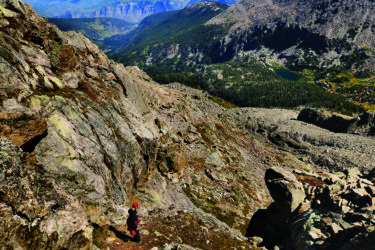The Local newsletter is your free, daily guide to life in Colorado. For locals, by locals.
When was the last time you went out for a morning run or bike ride and didn’t stop until the next day? Probably never. That type of feat takes commitment—the kind of commitment that Estes Park residents Quinn Brett and Josh Stevens have for raising money for spinal cord research.
Beginning Saturday, May 8, Brett, 40, and Stevens, 50, will spend a full 24 hours running and handcycling, respectively, as part of Wings for Life World Run, a worldwide fundraising effort for spinal cord research. The pair, both of whom have suffered injuries to their spines in their lives, hope their commitment to the cause will inspire others to donate or participate, even just for 24 minutes. (Visit the event website to give money to the “24-hour Estes Crew” or to enter to participate yourself.) “Everyone is on our team,” Stevens says. “We want to encourage as many people as possible to get involved however they can.”

In 2017, Brett, then a professional rock climber, fell more than 100 feet while climbing El Capitan in Yosemite National Park. The fall left her paralyzed from the waist down. Stevens sustained multiple injuries from roadside bombs during several special operations deployments with the Army. In 2011, he underwent his second neck surgery and was told he’d likely never run again. He has since proven that diagnosis wrong, participating in—and becoming a top finisher at—numerous ultramarathons.
Years after their accidents and surgeries, Brett and Stevens are doing more than just defying the odds physically. They are also on a mission to help doctors and experts find a cure for spinal cord injuries. A number of advancements have been made in spinal cord injury research in recent years, but many trials still need to be done on humans, which costs a lot of money. “All of this money goes to that research,” Brett says.
Brett works for Wings for Life, the nonprofit that is organizing this weekend’s worldwide event and helps finance cutting-edge scientific research, as well as for Unite 2 Fight Paralysis, which supports doctors and hospitals working to find a cure for spinal cord injuries. “Many of my muscles don’t work, but I also don’t feel. If I’m sitting next to a campfire, I’m going to burn my legs. My bladder doesn’t work. My bowels don’t work. Internal organs are not working,” Brett says. “A cure for this would do a lot. [It] would return more people back to the workforce. Instead of being sucks of money on the health care system, we’d be contributing more.”
Brett also has a gig with the National Park Service, where she is helping many parks add resources and small tweaks to trails that will make them more accessible for people who have varied mobility. She doesn’t want to pave trails through the wilderness; she just wants to make things a little more welcoming for all people.

This will be the second time that Brett and Stevens have completed a 24-hour event with Wings for Life. (Most people that participate engage in physical activities for much shorter increments, raising money through the Wings for Life website.) Last year, the duo raised over $5,000 when they ran and cycled laps around Lake Estes, which has a paved nearly four-mile loop, during unpleasant weather. “We’re hoping for better weather this year because last year it was a crazy hail and rainstorm,” Brett says. “But it’s a worldwide effort, so we can’t move the date or chicken out.”
“It’s an idyllic location for photos,” Stevens says about Lake Estes, “and I’ve done many ultramarathon events, but I really underestimated the physical discomfort caused by concrete.” Despite the conditions, Brett cycled 76 miles, and Stevens ran 100.
This year, the two athletes will utilize the high school track in town, which is more forgiving and provides a better opportunity for the community to come out and support, or do some laps themselves. “The track is a much more condensed space, so it will allow us to showcase local businesses, and have all of our friends and family come out,” Stevens says.
Ultimately, the duo hopes they can show people that it is still possible to have a life after suffering a spinal cord injury. “I want my friends with spinal cord injuries to be biking around town,” Brett says. “But I also want for us all to be having conversations with one another. I want for lots of people to understand why this is so important.”
Get Involved: If you can’t make it to Estes Park, you can participate from anywhere around the world. Just visit the Wings for Life website and sign on to run, bike, walk, skip, handcycle, or otherwise move as much or as little as you’d like to help find a cure for spinal cord injuries.








